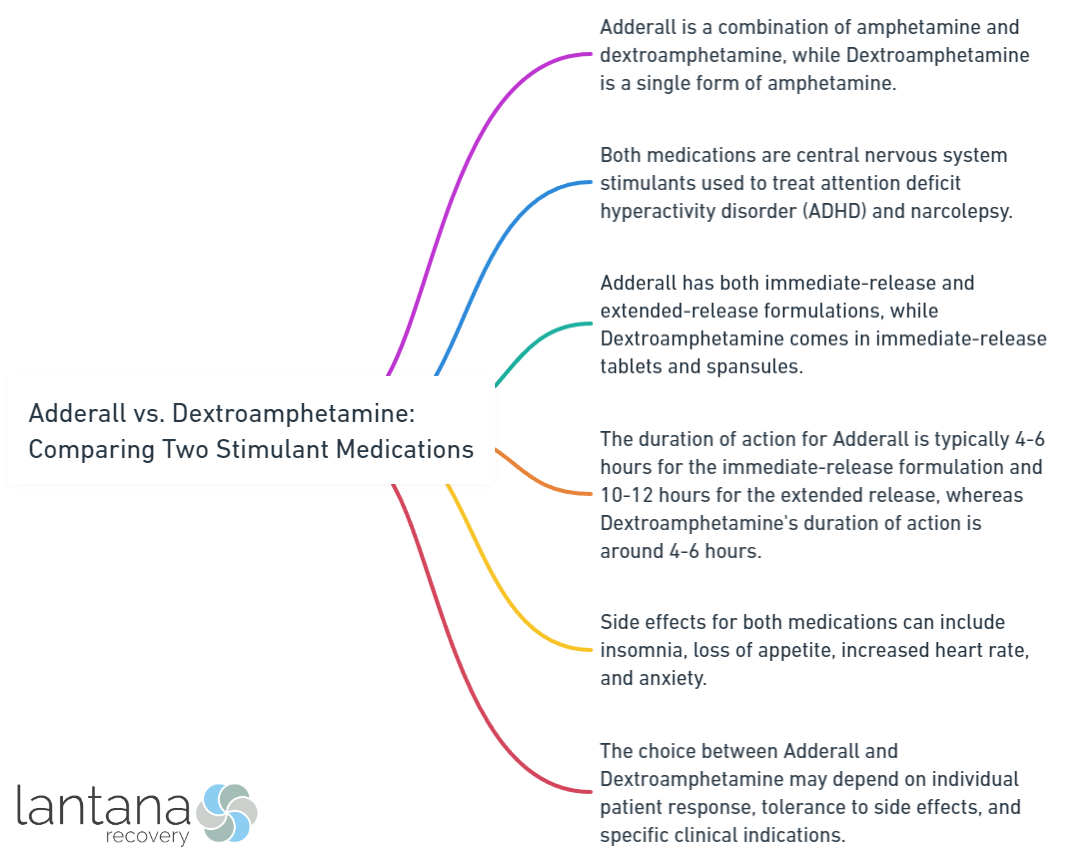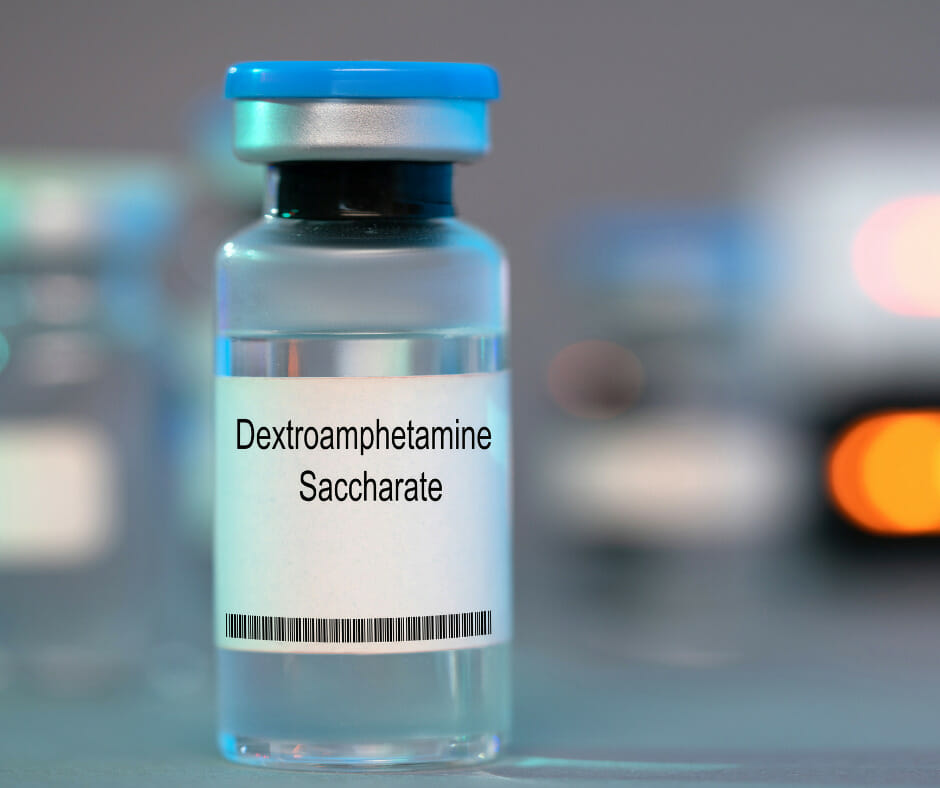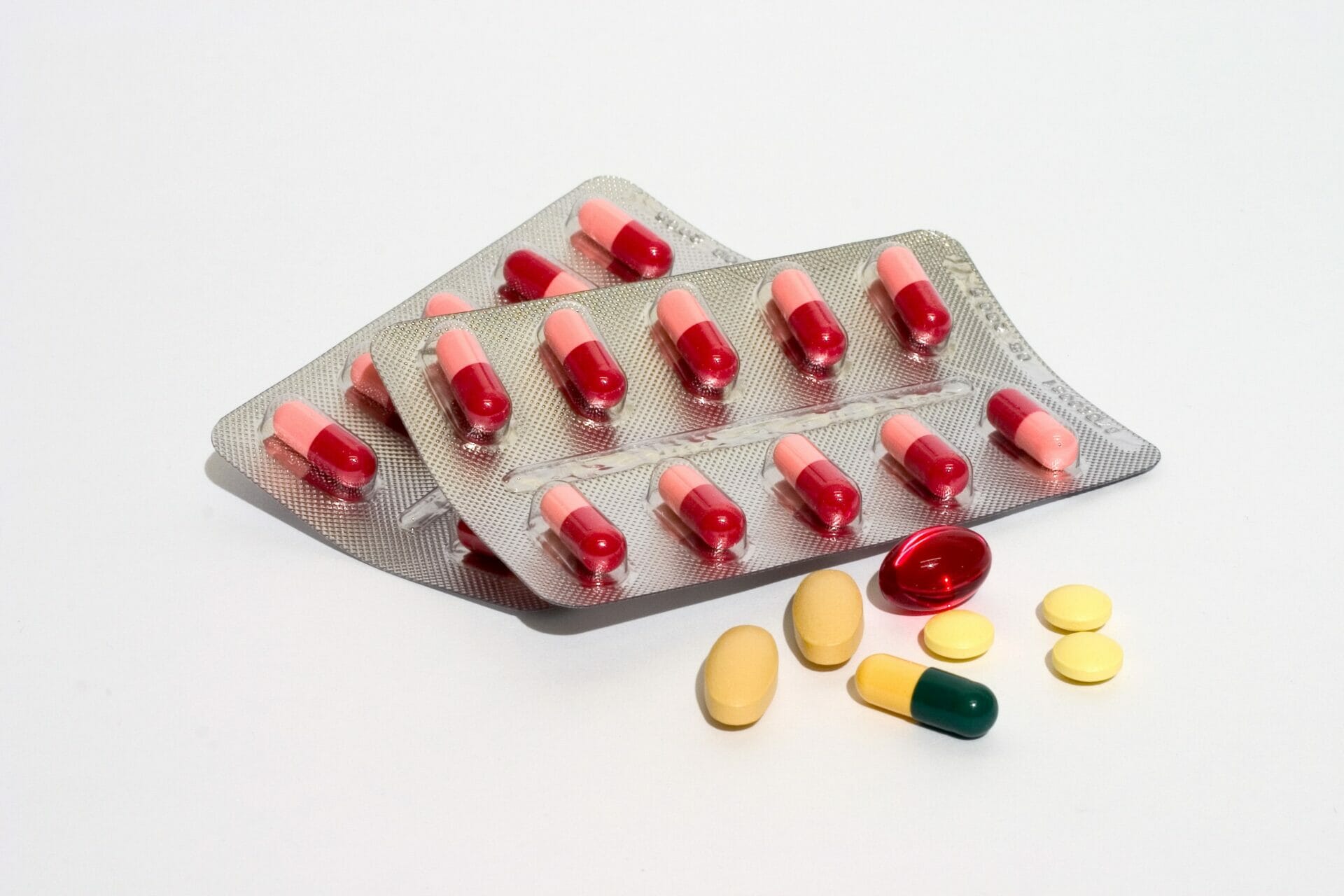Adderall and Dextroamphetamine are both stimulant medications commonly prescribed for the treatment of attention deficit hyperactivity disorder (ADHD) and narcolepsy. While they are similar, there are some differences between the two medications that are important to understand. To compare Adderall and Dextroamphetamine, it is crucial to have a comprehensive understanding of both medications, how they work, and their respective benefits and risks.
This article will provide an overview of Adderall and Dextroamphetamine, including their mechanisms of action, a comparison of their efficacy and safety profiles, dosage and administration considerations, duration of action, and potential for misuse and addiction. By the end of this article, you will have a better understanding of these two stimulant medications and which one might be more suitable for your specific needs.

Understanding Adderall and Dextroamphetamine
Understanding Adderall and Dextroamphetamine is crucial when comparing these stimulant medications. Here are some key points to consider:
- Active Ingredients: Both Adderall and Dextroamphetamine contain amphetamine salts. Adderall has a 3:1 ratio of dextroamphetamine to levoamphetamine, while Dextroamphetamine only contains dextroamphetamine.
- Indications: Both medications are primarily used to treat ADHD and narcolepsy. They help increase focus, reduce hyperactivity, and may also be used off-label to treat binge eating disorders.
- Effectiveness: Studies have shown that Dextroamphetamine may be slightly more potent than Adderall in treating ADHD symptoms, but the difference is minimal.
- Side Effects: Common side effects of both medications include increased heart rate, elevated blood pressure, insomnia, decreased appetite, and dry mouth. These side effects are generally mild and well-tolerated, but monitoring is important.
- Dosing: The dosage varies based on individual needs and responses. It is essential to follow the prescribed dosage and consult with a healthcare provider like Lantana Recovery for adjustments.
Understanding the similarities and differences between Adderall and Dextroamphetamine is important for informed decision-making when considering treatment options for ADHD or narcolepsy. Consult with your doctor about your specific needs and medical history to determine the most suitable medication. Remember, these medications should only be taken under medical supervision and as directed by a healthcare professional near you like those at Lantana Recovery.
What is Adderall?
What is Adderall? Adderall is a prescription medication used to treat Attention Deficit Hyperactivity Disorder (ADHD). It combines two stimulant drugs – amphetamine and dextroamphetamine.
1. Adderall improves focus, attention, and reduces impulsivity and hyperactivity in people with ADHD. It does this by increasing certain brain chemicals that affect concentration and impulse control.
2. Adderall comes in different strengths, from 5mg to 30mg. The prescribed dosage depends on the individual’s needs and response to the medication. It’s important to follow the prescribed dosage and not exceed it.
3. The effects of Adderall typically last for 4 to 6 hours. The duration may vary based on factors like dosage and metabolism.
4. It’s important to take Adderall as prescribed and follow the healthcare professional’s instructions. Stopping the medication abruptly can cause withdrawal symptoms, so consult a healthcare professional before discontinuing.
5. While Adderall can effectively treat ADHD, it may have side effects such as increased heart rate, elevated blood pressure, decreased appetite, and difficulty sleeping. Discuss any concerns or side effects with a healthcare professional.
What is Dextroamphetamine?
Dextroamphetamine, also known as Dexedrine, is a commonly prescribed stimulant medication for the treatment of attention deficit hyperactivity disorder (ADHD) and narcolepsy. Similar to Adderall, Dextroamphetamine is an amphetamine that increases the activity of certain brain chemicals, improving attention and behavior in individuals with these conditions.
Prescribed in immediate-release and extended-release forms, Dextroamphetamine helps enhance focus, reduce impulsivity, and increase attention in people with ADHD. However, it is essential to remember that Dextroamphetamine is a controlled substance due to the potential for misuse or addiction. Therefore, it should only be taken under the supervision of a healthcare professional and in adherence to the prescribed dosage instructions.
Historically, Dextroamphetamine was synthesized in the 1920s and its stimulant properties were discovered soon after. Extensive research and approval for medical use have solidified its effectiveness and safety profile for treating ADHD and narcolepsy. As a result, Dextroamphetamine has become widely prescribed to individuals with these conditions.

How Do Adderall and Dextroamphetamine Work?
Adderall and Dextroamphetamine function by increasing dopamine and norepinephrine levels in the brain. These medications are commonly prescribed to address attention deficit hyperactivity disorder (ADHD) and narcolepsy.
1. Mechanism of action: Both drugs augment dopamine and norepinephrine levels in the brain, which play a crucial role in regulating attention, focus, and impulse control.
2. Effect on neurotransmitter activity: Adderall and Dextroamphetamine enhance the activity of dopamine and norepinephrine by inhibiting reuptake. This leads to a prolonged presence of these neurotransmitters in the synapse, promoting increased signaling between neurons.
3. Benefits for concentration and alertness: Increased levels of dopamine and norepinephrine contribute to improved concentration and alertness in individuals with ADHD. This can enhance their ability to stay attentive and focused on tasks.
4. Enhancement of executive functions: These medications also improve executive functions such as planning, organizing, and problem-solving. By increasing neurotransmitter activity in the prefrontal cortex, the area of the brain responsible for these cognitive processes, Adderall and Dextroamphetamine support improved executive functioning.
5. Wakefulness promotion: In individuals with narcolepsy, Adderall and Dextroamphetamine encourage wakefulness and reduce excessive daytime sleepiness. This is achieved through stimulation of the brain and increased arousal.

Comparing Adderall and Dextroamphetamine
When it comes to comparing Adderall and Dextroamphetamine, there are several key factors to consider. From their efficacy and safety profiles to dosage and potential for misuse, each stimulant medication offers unique characteristics that can impact treatment outcomes. In this section, we will delve into these aspects, giving you a comprehensive understanding of how Adderall and Dextroamphetamine stack up against each other. So, buckle up, and let’s uncover the ins and outs of these commonly prescribed stimulants!
Efficacy and Effectiveness
Lakhan and Kirchgessner conclude in his about the misuse, cognitive impact, and adverse effects of prescription stimulants, that prescription stimulants are frequently prescribed for the management of attention deficit hyperactivity disorder (ADHD.) Medications such as methylphenidate (sold as Ritalin and Concerta), dextroamphetamine (Dexedrine), and dextroamphetamine-amphetamine (Adderall) aid individuals with ADHD in achieving a heightened sense of focus.
Both Adderall and Dextroamphetamine have been proven to be effective in managing ADHD symptoms by improving attention, reducing impulsivity, and controlling hyperactivity. However, the effectiveness of these medications can vary among individuals. While some may respond better to Adderall, others may find Dextroamphetamine to be more effective. Therefore, it is important to work closely with a healthcare professional to determine the best medication based on individual needs, taking into account factors such as age, weight, overall health, and personal preferences.
An individualized and personalized approach to ADHD treatment is necessary, and it may require trying different medications or adjusting dosages to find the most effective option. Consulting with an ADHD specialist can provide an assessment of your specific needs and help you make an informed decision regarding the use of Adderall and Dextroamphetamine. It is important to remember that ADHD medication is just one part of a comprehensive treatment plan. To achieve optimal management, it should be combined with therapy, behavioral interventions, and lifestyle changes.
Safety Profile and Side Effects
Adderall and Dextroamphetamine have similar safety profiles and potential side effects. When considering these medications, it is essential to evaluate their safety profile and potential side effects.
Common side effects may include decreased appetite, trouble sleeping, dry mouth, and headache. However, it’s important to note that in rare cases, more serious side effects like increased heart rate, high blood pressure, hallucinations, and mood changes may occur. It’s crucial to be aware of potential allergic reactions, which can manifest as rash, itching, swelling, or difficulty breathing.
Keep in mind that individual medical history and other factors may impact the safety profile and side effects of these medications. Before starting any medication, it is necessary to inform your healthcare provider about any pre-existing conditions, medications, or allergies you may have. This will help ensure your safety and minimize potential side effects.
To determine the best medication option for you, based on factors such as medical history, individual needs, and response to previous treatments, consulting with a healthcare professional is recommended.
Throughout the treatment process, continue to maintain open communication with your healthcare provider, as safety profiles and side effects can vary from person to person.
Dosage and Administration
When it comes to the dosage and administration of Adderall and Dextroamphetamine, there are important steps that need to be followed:
1. The first step is to consult a healthcare professional: Before starting either medication, it is crucial to seek guidance from a healthcare professional who can determine the appropriate dosage and administration for your specific needs.
2. It is advised to start with the lowest effective dose: Typically, treatment begins with the lowest effective dose to closely monitor its effectiveness and potential side effects. For instance, a study has found that “the efficacy rates of Adderall were evaluated based on comparisons with placebo using both parent and teacher measures of children’s behavior. The Adderall response rate ranged from 59% to 82%, and overall, 137 of the 154 participants (89%) showed a positive response based on either parent or teacher criteria” (Placebo-Controlled Evaluation of Amphetamine Mixture – Dextroamphetamine Salts and Amphetamine Salts (Adderall): Efficacy Rate and Side Effects, Ahmann et al., 2001)
3. Dosage adjustments may be necessary based on individual responses: Your healthcare professional may need to increase or decrease the dose according to how you respond to the medication.
4. It is important to adhere to the prescribed schedule: Take Adderall or Dextroamphetamine exactly as prescribed by your healthcare professional. Pay close attention to the recommended schedule and dosage instructions.
5. Regularly monitor the effectiveness of the medication: Assessing how well the medication is working is essential in determining whether any adjustments in dosage or administration are needed for optimal treatment outcomes.
6. Promptly report any side effects to your healthcare professional: If you experience any side effects, it is important to inform your healthcare professional so they can evaluate the situation and make any necessary changes to your treatment plan.
By following these steps, you can ensure the proper dosage and administration of Adderall and Dextroamphetamine, thus maximizing their effectiveness in treating ADHD. Remember, always consult with a healthcare professional for personalized guidance and closely follow their recommendations.
Duration of Action
The duration of action refers to how long a medication remains active in the body. When comparing Adderall and Dextroamphetamine, it is important to consider certain factors. To understand the differences in duration of action, the following table shows the approximate duration for each medication:
| Medication | Duration of Action |
| Adderall | 4-6 hours |
| Dextroamphetamine | 4-8 hours |
Both Adderall and Dextroamphetamine have similar durations of action, usually lasting 4 to 8 hours. However, individual responses may vary. Factors like dosage, medication form, and metabolism can affect how long the effects last.
When considering the duration of action, discussing your specific needs and preferences with a healthcare professional is important. They can determine the medication that aligns with your treatment goals and suits your needs.
Potential for Misuse and Addiction
Misuse and addiction are risks associated with stimulant medications like Adderall and Dextroamphetamine. It’s crucial to understand the potential for misuse and addiction before considering these medications.
1. Misuse of Stimulant Medications: Stimulant medications can be misused due to their potential for stimulating effects on the central nervous system. Some individuals may abuse medications like Prozac and Adderall to enhance focus, concentration, or productivity, especially in academic or professional settings. It’s vital to use these medications as prescribed by a healthcare professional to minimize the potential for misuse.
2. Addiction Potential: Both Adderall and Dextroamphetamine have the potential for addiction. They belong to the amphetamine class of drugs, which can result in physical and psychological dependence when misused or used recreationally. Individuals with a history of substance abuse or addiction may face a higher risk. It’s crucial to closely adhere to the prescribed dosage and avoid increasing the dose without medical supervision to reduce the potential for addiction.
3. Monitoring and Support: Healthcare providers play a vital role in monitoring the use of stimulant medications to prevent misuse and addiction. Regular check-ins, medication adjustments, and open communication can assist in detecting signs of misuse or addiction. It’s important to follow the prescribed treatment plan, report any concerns, and seek professional help if the potential for misuse or addiction becomes a concern.
4. Education and Awareness: Patients and their families should receive education about the potential risks associated with stimulant medications. Understanding the signs of misuse and addiction, as well as creating a supportive environment, can help minimize these risks. Open dialogue with healthcare professionals and adherence to recommended guidelines are crucial for safe and effective usage.

Which Medication is Right for You?
Choosing the right medication can be a crucial decision when it comes to ADHD treatment. In this section, we’ll explore the factors to consider and the personalized approach needed to determine which medication, Adderall or Dextroamphetamine, is the best fit for you. By taking into account individual factors and considering a personalized approach, we can delve deeper into the world of stimulant medications and make an informed decision that caters to your unique needs.
Considerations for ADHD Treatment
When considering ADHD treatment, there are several important considerations to keep in mind. These include efficacy, safety profile, dosage, duration of action, and potential for misuse and addiction. It is crucial to select a treatment option that effectively manages ADHD symptoms.
Two medications that have been proven to improve attention, and focus, and reduce hyperactivity in individuals with ADHD are Adderall and Dextroamphetamine. In the case of Adderall and Ritalin, researchers Pelham, PhD et al., found that both medications consistently outperformed the placebo, leading to significant enhancements in the occurrence of negative behaviors, academic performance, and assessments of behavior by both staff and parents in the study A Comparison of Ritalin and Adderall. It is essential to have a clear understanding of the potential side effects and risks associated with these medications. Common side effects include loss of appetite, sleep disturbances, and increased heart rate.
Proper dosage and administration, tailored to the individual’s needs, play a critical role in maximizing the benefits of ADHD medications. Close monitoring and regular follow-up with a healthcare provider are necessary for optimal results. Knowing the duration of action of a medication is also important in order to effectively manage symptoms throughout the day. Adderall typically lasts for 4-6 hours, while Dextroamphetamine may remain active for up to 8 hours.
It is worth noting that both of these medications are classified as Schedule II controlled substances due to their potential for misuse and addiction. It is therefore important to strictly adhere to prescribed guidelines in order to minimize risks. Consulting with a healthcare professional in an expert institution like Lantana is highly recommended in order to make an informed decision regarding the best ADHD treatment option available.
Individual Factors and Personalized Approach
When choosing between Adderall and Dextroamphetamine for ADHD treatment, it is important to consider individual factors and take a personalized approach. Understanding these factors can help you make an informed decision based on your specific needs and circumstances.
1. Medical History: Consider your medical history, conditions, and medications. Certain medical conditions or drug interactions may influence your choice between Adderall and Dextroamphetamine. You should let your doctor know what other medication you’ve been using like Acamprosate for alcohol use disorder (AUD), for example.
2. Side Effects: Take into account your tolerance for side effects. Both medications can have similar side effects, but the severity and specific symptoms may vary. Discuss previous experiences with side effects with your doctor.
3. Response to Treatment: Consider your response to previous ADHD treatments. Discuss with your doctor the effectiveness and side effects of Adderall or Dextroamphetamine. This information can guide your decision-making process.
4. Lifestyle Factors: Consider your daily routine, lifestyle, and preferences. These factors can influence your treatment plan, including timing and dosage. Discuss any specific requirements or limitations with your doctor.
5. Personal Goals: Identify your personal goals and desired outcomes. Discuss with your doctor how each medication may align with your goals, such as improved focus, reduced impulsivity, or better overall functioning.
By considering these individual factors and taking a personalized approach, you and your healthcare provider can determine the right medication for you.
Frequently Asked Questions
What are Adderall and Dexedrine?
Adderall and Dexedrine are both stimulant medications used to treat ADHD and narcolepsy. They are classified as Class 2 controlled substances and are known for their potential for addiction and abuse.
What are the differences between Adderall and Dexedrine?
Adderall is a combination of amphetamine and dextroamphetamine, while Dexedrine contains only dextroamphetamine. This makes Dexedrine generally considered stronger than Adderall because it contains the most active ingredient in stimulant medications.
What are the main uses of Adderall and Dexedrine?
The main use for both medications is in the treatment of ADHD, a common condition in children that affects focus and can impact school performance and social development. Both medications can also be used to treat narcolepsy, a condition characterized by sudden and uncontrollable episodes of falling asleep.
What are the potential side effects of Adderall and Dexedrine?
Common side effects of both medications include upset stomach, dry mouth, headache, loss of appetite, difficulty sleeping, dizziness, and weight loss. Less common side effects include agitation, anxiety, blurred vision, nausea, fever, hallucinations, abnormal heartbeat, and muscle weakness.
What are the risks associated with Adderall and Dexedrine use?
Health risks associated with stimulant use include weight loss, insomnia, slowed growth, nerve problems, circulation problems, heart problems, muscle breakdown, and serotonin syndrome. It is important to follow the prescribed dosage and seek medical attention for serious side effects or misuse of the medications.
Are there any precautions or warnings for taking Adderall and Dexedrine?
Both medications have a high potential for abuse and should be used under medical supervision. Pregnant women should exercise caution when taking these medications, as there may be risks to the developing fetus. Nursing mothers should avoid taking these drugs, as they can pass through breast milk and have toxic effects on infants. It is also important to be aware of potential drug interactions.









